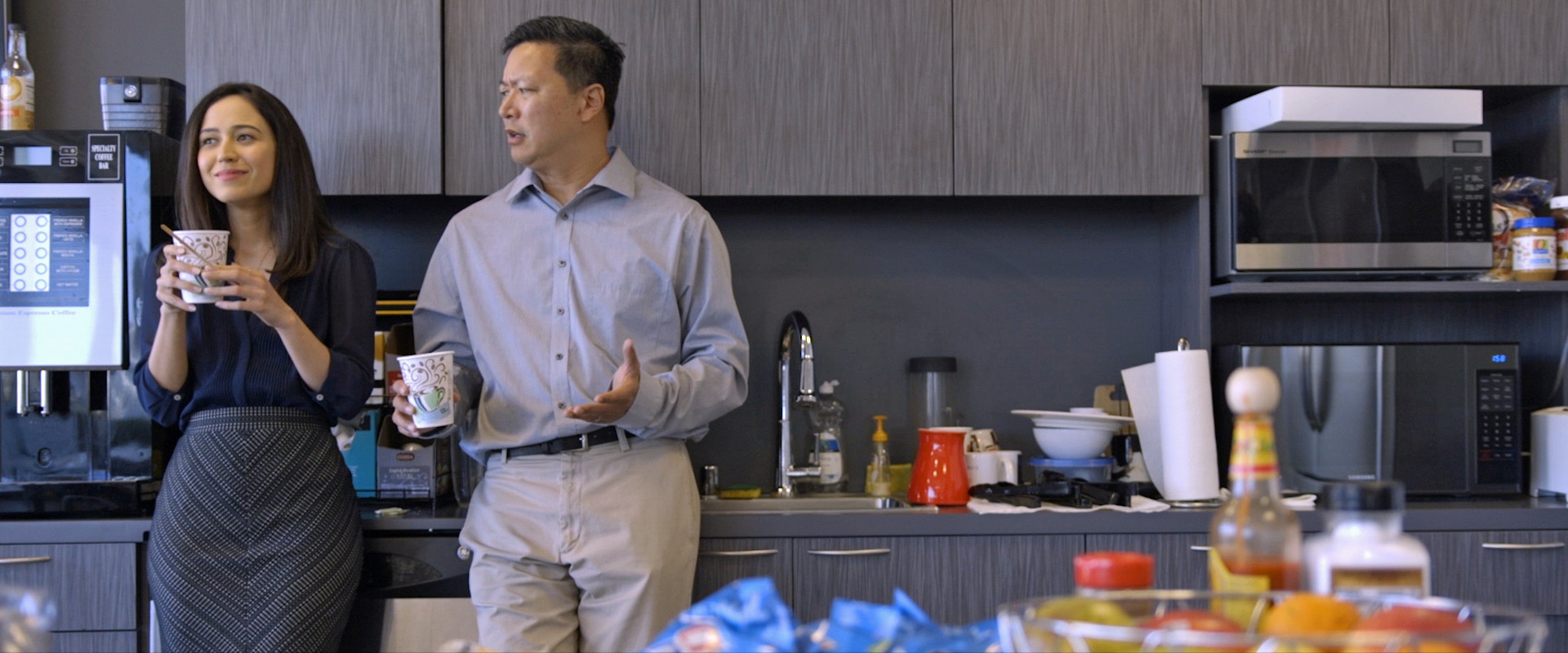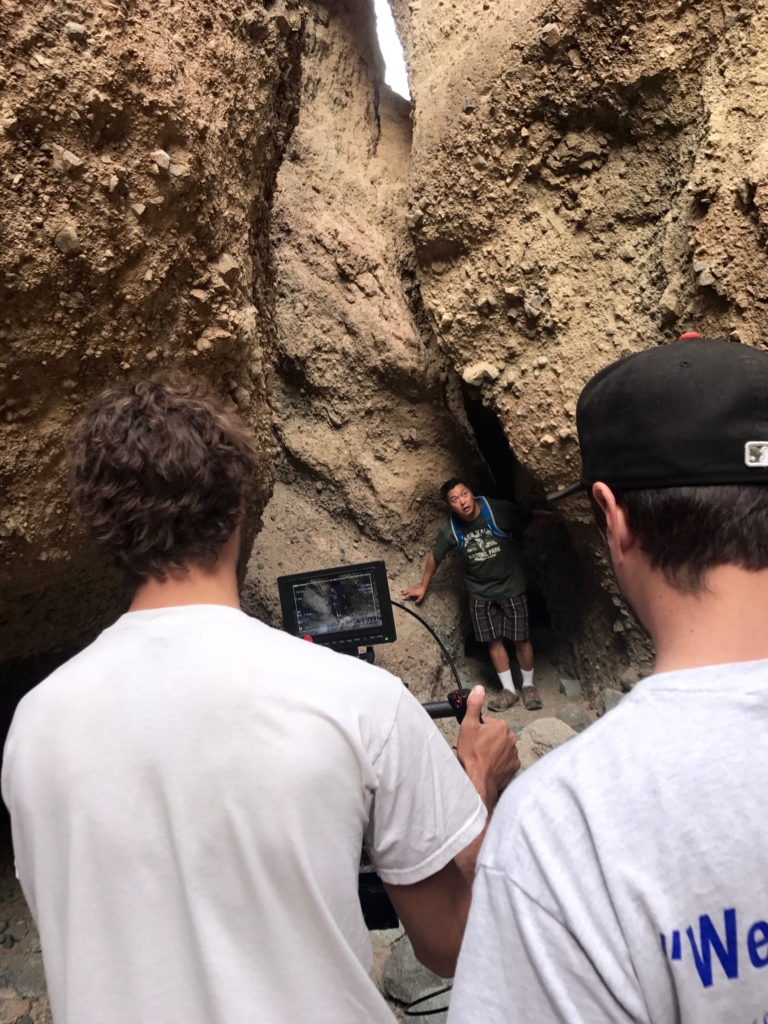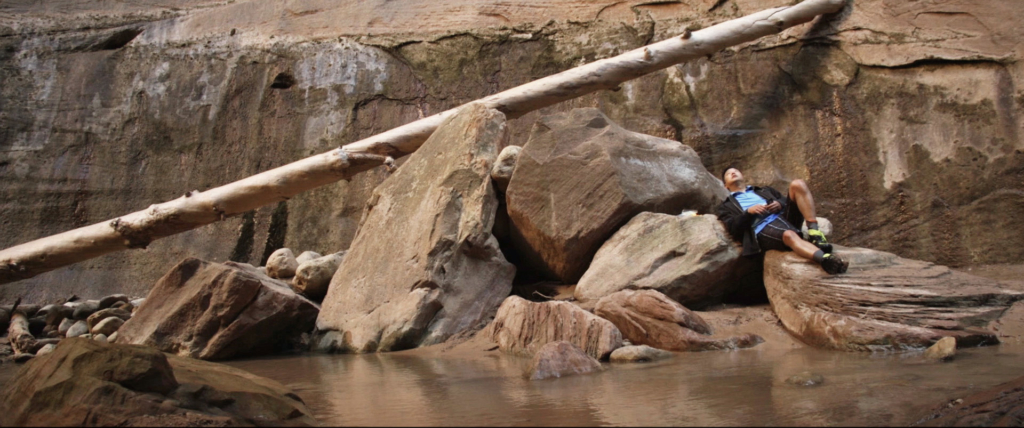
Tom Huang is a unique and persistent Asian American filmmaker who starred, wrote and directed three features over the last two decades. His latest feature Find Me will have its world premiere at the Chicago Asian American Showcase. CHOPSO is currently streaming Tom’s second feature Why Am I Doing This? and his webseries Unusual Targets. CHOPSO took the opportunity to interview Tom on his third feature before its imminent world premiere.
Find Me is your third feature and it has been almost 10 years since your last feature Why Am I Doing This? Can you talk about how Find Me happen and the journey of how you put it together?
TH: Well, a couple things happened… I have this other film I’ve been trying to get off the ground the past few years, and it’s almost gotten somewhere a few times then fell apart, so while I’ve been going through this frustration, I felt like I needed to shoot something or I was going to go crazy. So I was on a trip and hiking through the Narrows in Zion National Park, this trail that goes through these slot canyons with towering, gorgeous walls, with the only path the actual Virgin River, and I thought to myself, “I want to make a movie that will make people point to the screen and say, ‘I want to get there’.” So from that thought, I started putting the story together, with the idea of making each of the outdoor areas a character in itself that helps heal a character. I traveled to Zion, Death Valley and Yosemite on my own with four different cameras at once, taking pictures and videos of these trials I wanted to feature so I know what I could get visually with a very simple camera setup, then talked a few filmmaker friends of mine to join me in making this film, and suddenly, we were making an ultra-low budget feature out my pocket. To make it work so we could work our jobs and still shoot the film, we shot the film 3-4 days every month for almost a year, and I edited the parts that we shot as the year went along. It actually worked out well, as it allowed us to shoot at the optimal time of year in each area. After a year, we suddenly had a finished feature film!
In a nutshell, what is Fine Me about?
TH: Find Me is about Joe, an accountant who is trying to recover from a painful divorce. When his friend and “office wife” Amelia mysteriously disappears for weeks, he reluctantly goes back out into the world to try to find her through clues she leaves in National Parks across the West.
 It’s amazing that you have been an actor, writer and director in all of your features… can you talk about what it is like to wear all three hats at the same time? There are a handful of filmmakers like Kenneth Branagh who do this and do it well.
It’s amazing that you have been an actor, writer and director in all of your features… can you talk about what it is like to wear all three hats at the same time? There are a handful of filmmakers like Kenneth Branagh who do this and do it well.
TH: Ha! I am so flattered to be compared to someone like Kenneth Branagh, but alas, I only wish I was as brilliant an actor as he… I may be more of a poor man’s Asian Woody Allen, someone who can somewhat successfully portray a character that is close to own self. Being that I’ve always had to work with limited budgets, part of the reason I do it is for financial reasons, as it’s cheaper and easier for me to haul my butt around at any moment to shoot, and I make sure when I write a character I’m acting that it’s not too much of a stretch from my own personality. That being said, I really enjoy acting and in particular, have developed my own system in acting in my own films…. this includes a lot of pre-production preparations in storyboarding and talking with my actors and cinematographers, making sure we all are on the same page of the vision of the film and what the characters are about. Then, when it’s time to shoot, it involves a lot of trust in the talented people I’ve surrounded myself with in letting them do their jobs, so I can make sure I can focus on my own acting, as well as developing a feel that the scene is working while being in the scene. It also means to make sure to take time out, even with limited time on these low-budget schedules, to review takes for every scene, so I can be sure we’re getting what I envisioned (for the most part, anyway).
 Is it easier making your third feature around? What have you learned from your last two features that you’ve brought to make Find Me?
Is it easier making your third feature around? What have you learned from your last two features that you’ve brought to make Find Me?
TH: It’s easier and harder at the same time. It’s a bit easier because I’ve done this acting/directing thing before and once things get into a rhythm, have a really good feel for that having an idea if a scene is working or not, and I think I’m able to prepare myself beforehand more efficiently. It does get a little difficult in other ways, because at the same time, I try to take my filmmaking a step further with each film, so I’m trying different things and different ways to shoot things depending on the situation, learning from what I wanted to do different from my last films, and this sometimes means learning a new language visually, or understanding the possibilities of a new setup, such as a steady-cam-like setup or a drone. It’s all very thrilling and fun, but at the same time, when you’re using these things for the first time, you have to learn how it works best and what you can’t do with them.
Can you tell us about all the festivals where Find Me will be playing?
TH: We’ve been extremely fortunate enough to get into a good handful of festivals so far that will occupy us the whole spring, though some festivals have asked us to withhold announcements until they’ve announced lineups. I can tell you that we will be starting off in Chicago on April 11 at the Chicago Asian-American Film Showcase in the iconic Gene Siskel Film Center, then on to the Atlanta Independent Film Festival on April 15th, then moving on to be the Closing Night film at the DisOrient Oregon Asian-American Film Festival in Eugene, Oregon on April 22nd. We have four other festival lined up after that we’ll be announcing shortly, I’ll be sure add to them to this article as we hear dates, or you can check out our website at www.findmethefilm.com. Keeping our fingers crossed to keep the momentum going, but have been so grateful for the amazing festivals that have taken us so far.
Having been making films for over two decades, what are your expectations on your latest feature Find Me in terms of business and distribution?
TH: Honestly, I have no idea… every year the models for distributions change, and things have certainly majorly changed since my last feature, so I just put my head down and concentrated on getting the film finished first before looking ahead. I am pleased that my purposely designed diverse cast for the film has appealed to film festivals of all kinds, as I think it indicates a universal appeal for the film. In addition, people have really taken to the scenes of the outdoors, so I’m hoping this will be another avenue to explore as far as an audience to appeal to. As far as the other things like distributors and sales agents and all that, we’re still looking into that and trying figure out whom to reach out to. I love writing, directing, acting and producing, but dealing with all this business stuff isn’t really up my alley, so at this point, just researching still and talking with people (like you guys) to get some direction.
 Now that you’re a seasoned filmmaker, what advice would you give to yourself when you were about to make Freshmen? What would you have wished you had done differently?
Now that you’re a seasoned filmmaker, what advice would you give to yourself when you were about to make Freshmen? What would you have wished you had done differently?
TH: Of course, this is a tough thing to answer, as I wouldn’t have learned unless I experienced the mistakes and mishaps from my first film, so I wouldn’t have changed those aspects of it. But with that in mind, I guess I’d tell myself to be better prepared before the shoot to know what I wanted visually from the film, in the look, in the framing, by storyboarding everything and going over it with my DP so I understood that we both had to same idea of what we were shooting. I was fortunate enough that my DP at the time, Brian Harding, had a strong visual style himself, and after a while he kind of guided me through what could or could not work with the set-ups we had within a consistent look and feel… but in the meantime, I mainly just aggravated him with my indecision and not understanding what I really wanted for each scene. And then the other thing would be to be careful how you cut corners, no matter what limit of time or budget you might have, be sure you get the shot you want… there’s only limited time and resources that you’ll have the actors and crew around for a scene, and if you waste that by making a shot that’s not up-to-par that you’ll either have to toss or put on the screen that will ultimately weaken your film, you’ve wasted everyone’s time. And don’t do the shot unless you have a reasonable expectation to get what you want.

